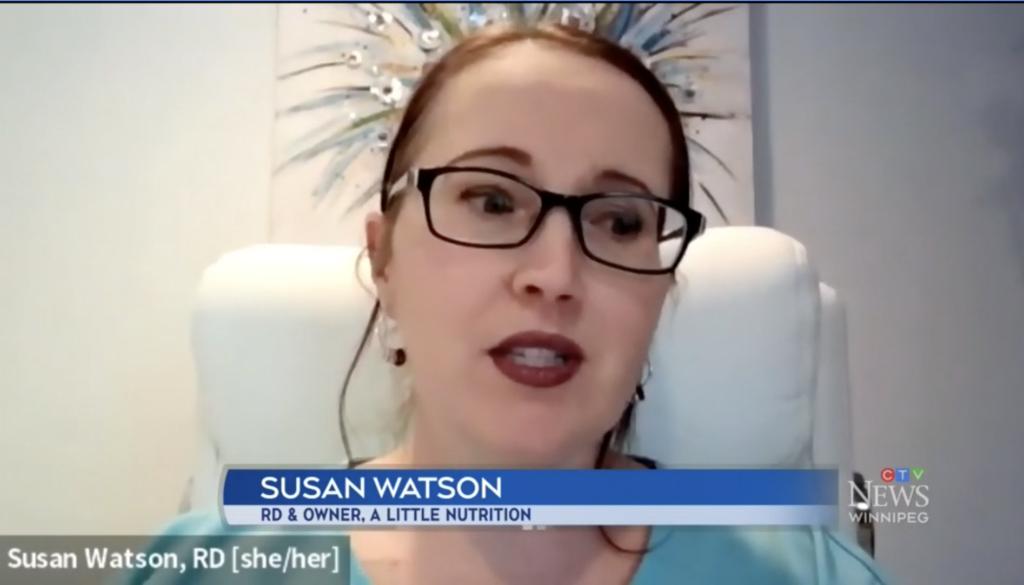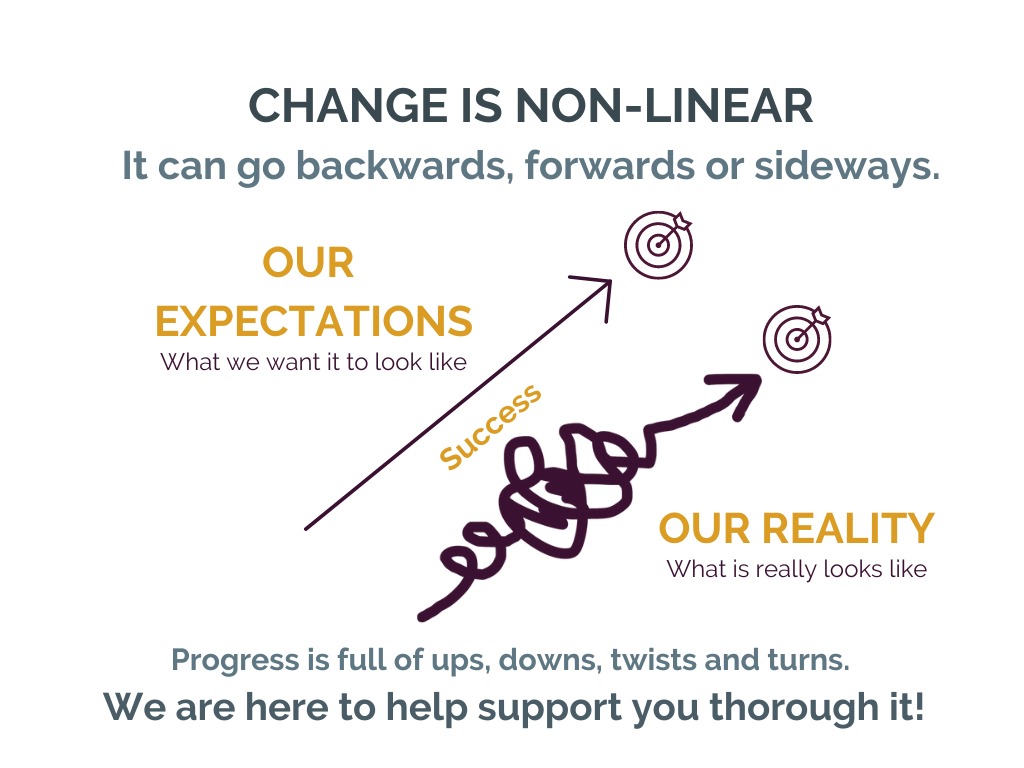Table of Contents
As you all know, New year’s resolutions and goal setting have a lot of hype at the start of the year and quickly lose steam as the months go on. Often in January, A Little Nutrition receives a lot of media inquiries asking us to provide our top tips on how to get healthy for the upcoming year. But we have found that even though our tips for setting non-diet health intentions are simple and straightforward, many people find it nearly impossible to take them into account.
Why?
Probably because we live in a culture where thinness is praised and body diversity isn’t even considered. But in our practice, we have found that setting non-diet health intentions are more sustainable than traditional diet programs. So, this year instead of trying to shrink your body or do a short-term rigid diet program, we challenge you to do something different!
See our media interview here
https://winnipeg.ctvnews.ca/video?clipId=2592195&binId=1.1206950&playlistPageNum=1
Fast forward to 02:33 mins.

Here Are Our 4 Non-Diet Health Intentions For 2023
1. Just say “NO” to diets and diet culture.
We know that diet restriction, and undereating leads to rebound eating or binge eating. But have you heard of “The Last Supper syndrome“? The Last Supper Syndrome is when people consume a higher amount of food than they usually would before starting a diet because they presume they won’t eat again. It is their last ditch effort before the “dietary cleansing” starts. The last supper syndrome is like a farewell-to-eating-foods-we-love party.
Diets are not a sustainable way to eat, live your life, or attain balanced nutrition. Diet restrictions often lead to rebound hunger and eventually binge eating—the opposite of what we want for our health intentions.
So, can we say “NO” to diets and diet culture this year? It might be hard to believe, but not dieting this year will be better for your long-term health.
What to do instead:
- Realize that you don’t have to change your body size to be healthy and eat well.
- Improve your nutrition by adding nourishing foods you might be lacking, like fruits, vegetables, and whole grains. Stop focusing on cutting out foods.
- Find new ways to move your body that feels good for you and is sustainable.
2. Stop Moralizing Food.
Let’s set a goal of not moralizing food this year! But what does moralizing food mean? If we label foods as either “good or bad,” we attach morality to eating. Eating is not a moral issue!
If we view foods as “bad,” how do you think we feel about ourselves when we eat these “forbidden” or “bad foods”? Pretty crappy.
In reality, food is only “bad” if it has green fuzzy mold growing on it.
This year, let’s stop labeling food as good or bad!
What to do instead:
- Focus on how food makes us feel inside. Does what we eat give us energy, or does it leave us tired or sluggish?
3. Nourish your body regularly.
Skipping meals or forgetting to stop to eat can have lasting effects throughout the day and can negatively impact your health intentions. When we skip a meal or forget to eat, our body knows and tries to tell us by giving our body signals. These signals can be quiet and subtle or loud and strong. For example, a growling stomach, a headache, tiredness, fatigue, moodiness, or “hangry.”
Many people have learned how to ignore these “red flags” our body is trying to signal us to eat. Diet culture tells us to push past the discomfort of hunger and acknowledge triumph if we can power our way through skipping and missing meals or ignoring our hunger.
But seriously, the body sensation of hunger is no different from the body sensation (or rather body signal) to tell us if our bladder is full. It doesn’t make sense to ignore the body sensation of going to the bathroom, so why would it make sense to ignore hunger?
It is hard to eat well, feel energized and move the body more when you may be impacted by “brain drain” or low mood. Staying nourished throughout the day is critical. Even though it might seem like you are overeating, remind yourself that your body needs to be fed at regular intervals (every 3-4 hours).
Remember, your body needs to be nourished with balanced meals containing protein, grains, starches, and fruits and vegetables.
Simple no-cook balanced meals
- Toast, peanut butter, and an apple
- Grapes, cheese, and crackers
- Hard-boiled egg, muffin, and strawberries
- Smoothie: Greek yogurt, fruit, dry oats, and water
- Oatmeal, almonds, and fruit
- Salad: Spinach, canned tuna, croutons
- Carrots, hummus, crackers, and cheese
- Greek yogurt cup, granola, fruit
Prioritizing a bit of meal prep and meal planning a few times per week ensures you can stay energized.
Also, Check Out This Workshop MINDFUL VS. MINDLESS EATING: UNTANGLE HUMAN NEED FROM “HUNGER” + FOOD
4. Be Curious Rather Than Critical
Consider your inner dialogue (how you talk to yourself) this year.
If you have set health intentions that didn’t work out or struggle to execute your plan, try to be kind to yourself this year. Diet culture may have conditioned you to think that you “fell off the wagon” or that you have no willpower. However, willpower is not an effective strategy for changing behaviors. Willpower doesn’t take into consideration your environment, emotions (which can affect your motivation levels), stage of life, physical condition (like lack of sleep), and previous attempts and failures. Perceived failure often diminishes our willpower. Willpower is just like the muscles in our body. Using your muscles too heavily in a short period of time will fatigue them fast.
If you set any health intentions or goals this year, think about being curious and not being critical of yourself if or when things don’t work out.
Consider these inner dialogue examples.
Negative
Self: I wanted to start walking every day, but why have I yet to start?
Negative/critical self: I can’t do anything right.
Positive
Self: I wanted to start walking every day, but why have I yet to start?
Kind and curious self:
- Why haven’t I started to do what I wanted to do yet?
- What is getting in my way?
- Oh ya, it’s -40 outside, and it sucks to walk outside right now. I am afraid of slipping and hurting myself.
- Is there something else I can do to start walking more?
- I could dust off that treadmill at home and find a new Netflix show to watch while I walk.
- I could get a better winter jacket and crampons for my boots and try walking outside on days when the wind isn’t too bad.
- I could try going to that park that has groomed trails to walk on.
If we remain critical and unkind to ourselves, we will likely always stay stuck. However, if you bring curiosity into your thinking, you can brainstorm ideas to solve your problem and get unstuck.
Many people have an “all-or-nothing mindset” when setting goals or wanting to change a habit or behavior. For the most part, change isn’t linear and usually has a lot of bumps along the way. If we don’t account for these bumps along the way, it is easy to fall off and lose focus on what you want to achieve.

You will be more successful in achieving your health intentions this year if you remain curious and not critical, practice a mindset of flexibility versus “all or nothing” thinking, and, most of all, be kind to yourself. Life is hard, and making changes is hard too. Improving health can be a journey. You will be more successful if you focus on taking one step at a time.
If you need help making changes to your health or relationship with food and movement, we can help you. We work with people who want to improve their health without diet programs or restrictive eating patterns. We help our clients learn to nourish their bodies in a way that feels good without guilt or shame.
If you want to start improving your health, book an appointment HERE.
Pin For Later






More Stories
Avocado Cacao Mousse – JSHealth
Janelle Brown on Garrison’s Mental Health Before His Death
How To Finally Beat Insomnia